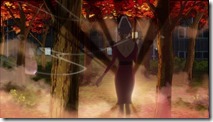 |
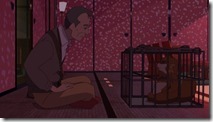 |
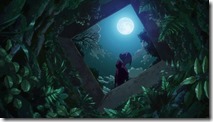 |
It’s flawless and brilliant episodes like this that make being an anime fan such a wondrous experience.
It’s not easy to put into words just why, but that was probably my favorite episode of any Summer series – must be a manifestation of my idiot blood. Uchouten Kazoku was definitely not love at first sight for me – more of a slow build – but the series has a way of crawling into your consciousness and building a nest. It’s a truly magical, enchanting experience – fiercely intelligent, emotionally laser-accurate and heartbreakingly beautiful.
I spent some time in Kyoto last week, and there’s no question that revisiting some of the sights that I love after watching this series is an interesting experience. Anyone who’s spent any time there is likely to tell you that Kyoto is a magical, enchanting place – not in the sense of a museum piece, like Venice, but a working, sometimes grimy city where the incalculable weight and beauty of the past co-exists with the mundanities – and wonders – of the modern world. There’s something of that in the essence of what makes Japan as a whole so compelling but nowhere is it more profound and inescapable than Kyoto. Spending time there you sometimes feel as if the city and the inhabitants know secrets you don’t, and that there’s an alchemy to the place that causes beauty to appear anywhere and at any time, even where you least expect it. And Uchouten Kazoku captures what it feels like to be in Kyoto, feeling that sensation, better than any recent anime has.
A poster on Animesuki (RollingPenguin) made a comment about Uchouten Kazoku that I quite like: the show is very weird, but it actually has no idea that it’s weird. I would take it further and say that it’s a series that quite intentionally presents overt surrealism in a strongly realistic way, and that combination is vital to its success. This series would never have worked if it’d been directed by Yuasa Masaaki, as Tatami Galaxy was – or at least, it would lack the emotional resonance and sincerity that elevates it above that title. It’s the earnest depiction of events that makes this show so effective – the depth and believability of the bonds between the characters (especially the Shimogamo family) and the embrace of the simple details of everyday life, even when it’s being lived by tengu and tanuki. At its best fantasy can often reveal truths in ways that more “realistic” genres cannot, and so it is here.
Make no mistake, Uchouten Kazoku is a difficult series. I think the addition of Yodogawa-sensei has changed the dynamic in a very fundamental way by bringing the strange and vexing notion of being eaten to the surface. Yodogawa himself acknowledges the contradiction – to love something, yet want to consume it. He talks of his trips around the world, eating strange things wherever he goes, and how it reflects his respect for that which he consumes, and of his love for eating “kawaiimono” – cute things. He also talks of how much he’d rather be eaten by a tanuki himself than be cremated and eaten by microbes, a “lonely” fate. Yasaburou – who has every reason to resent and even hate the Professor – rightly points out that for humans, it’s easy to say such things because they have no worry about being eaten. Yet Yasaburou doesn’t hate Yodogawa, even likes him – and certainly doesn’t hate Benten, who also dined on Souichirou. In fact he even admits what’s been obvious to me from the first episode, that he’s in love with her.
Yodogawa is a strange one, a man who watches Benten fly from rooftop to rooftop and holds conversations with tanuki he’s about to consume, yet at least pretends to have no direct knowledge of the mystical world that underpins this premise. These literal flights of fancy with Benten are quickly becoming highlights of the anime year, full of gorgeous imagery (such as Benten framed in a dreamlike haze of moonbeams and tobacco smoke) and difficult emotions, and the conversation between Yasaburou and Yodogawa after Benten left them on a rooftop in the full glory of the Koyo autumn colors was one of the most beguiling in anime this year. The topic of their talk is strange and there’s a palpable discomfort in watching Yasaburou endure it, yet it’s incredibly natural and flows as smoothly as the Kamogawa. This is indeed a kind of “naturalistic surrealism” – something if not unique to Uchouten then at least extremely rare in anime, and even more so when done this well.
What, then, of this notion of the nobility of being consumed – a sentiment that Souichirou expresses himself to Yodogawa on the night of his death? “I’ve fulfilled everything I have to live for. I’ve sowed my seeds and nurtured them to an extent, and fulfilled my role as a tanuki.” he tells the Professor. Indeed, his biggest worry is that he might taste bad, and it’s no coincidence that we see so much of what Souichirou was manifest in Yodogawa in the present, as he speaks to Souichirou’s son. It’s tempting to pass this off as some kind of profound Buddhist notion of the cycles of existence, but of course it’s more complicated than that – many schools of Buddhism are resolutely vegetarian, and of the Buddha himself it seems that while for a time he accepted the eating of meat, he never condoned the killing of animals oneself, and his final scriptures seem to indicate an unconditional opposition to the eating of meat. I think it’s still too early to say just where Morimi intends to go with this theme, but it should certainly be fascinating to find out.
Uchouten Kazoku exists in a world between waking and dreams, where reality meets myth and love and death are intrinsically linked. Why does Benten sit by the edge of Yajirou’s well and cry alone at night – is she the “child who cries for no reason”, or someone who cries for very specific reasons? She’s the nexus of this story, the true femme fatale who beguiles men and boys human, tengu and tanuki and leads them down a path of danger and despair – perhaps that’s why she sits and cries, knowing this to be her inescapable fate. Is it worse to be eaten, or to be compelled to consume and live with the weight of the lives you’ve consumed? Benten is the faerie light that leads Yasaburou into peril, Kaisei the ladder which returns him to safety – yet it’s the fire he chases, even knowing the danger. It’s our fate, it seems, to be drawn to that which burns and consumes us – an essential contradiction of our existence, and Uchouten Kazoku is a series that’s built on contradictions.
 |
 |
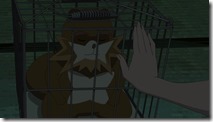 |
 |
 |
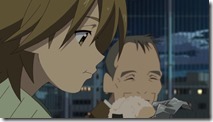 |
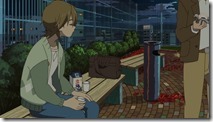 |
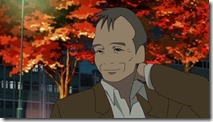 |
 |
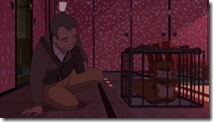 |
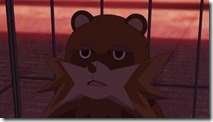 |
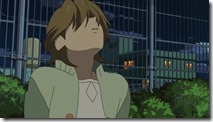 |
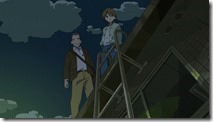 |
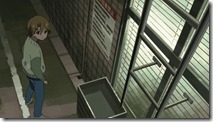 |
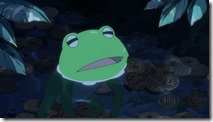 |
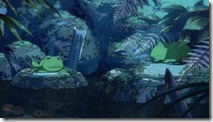 |
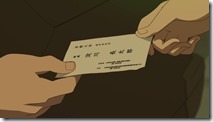 |
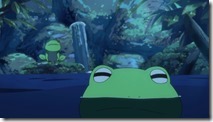 |
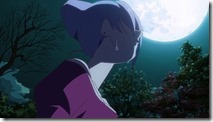 |
 |
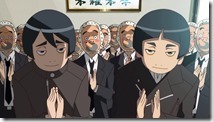 |


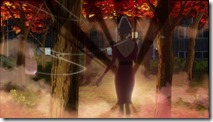

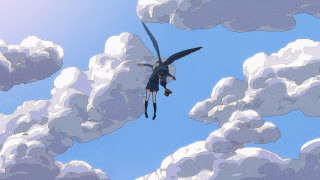
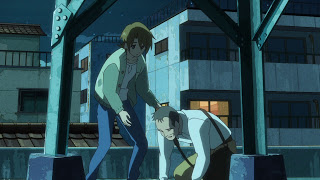
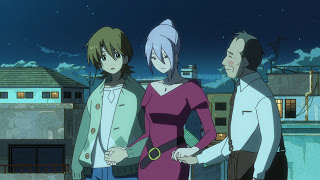
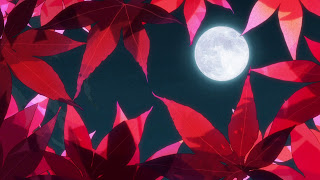
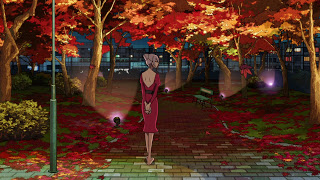
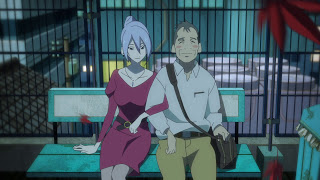


l3reezer
August 13, 2013 at 7:53 am"I guess it's a manifestation of my idiot blood."
I don't blame you for quoting that, any one would have taken that chance to
Ngai-Han Liu
August 13, 2013 at 10:06 amWas an awesome episode, beautiful in so many ways. Really enjoyed the conversations and flashbacks of Souichirou's final day (magnificent tanuki indeed!)
Aside from that, I'd love to pit that professor in carefree argument with a "morals" based vegetarian; of course with a cup of sake in his hand, the opposition hopelessly failing to get a point across against his: "to eat is to love".
For sure one of my favourite anime this season and one of the most valuable experiences in my relatively short anime memory ^^.
ishruns
August 13, 2013 at 12:14 pmThe best way I can describe Uchuoten Kazoku is that it is like going, once a week, to this great, quiet restaurant with a lovely clientele and staff. The meal is delicious and yet simple, arranged in a creative manner. By the end of it you neither feel hungry nor bulging, but satisfied. While giving the tip and check, you talk to the waiter about his wife before being handed your coat and being waved out. And then your welcomed back with a smile the next week.
UK is like that. It's the complete package. That the sum far surpasses the parts. That wiki could never give a summary that accurately describes it. It is something that can only be experienced. UK is mellow and immersing, a relaxing glass of wine rather than a couple of 6-packs. Slice of life is one of the most varied and misused terms in anime today but UK fits like a glove. It really is just a slice of these fantastical yet realistic characters and as we cut more pieces each week we find new layers and new fruits within.
I could never understand why GE liked Tsuritama as much as he did but I feel much the same as he did about UK. It truly feels incomparable and is the finest thing PA have ever made and unfortunately will be the biggest flop they've ever had. This beautiful yet ugly world.
ishruns
August 13, 2013 at 12:16 pmOh and I guess GE finds it as good as HxH since its a full post. So do I. How such different shows can be so enjoyable is the charm of anime.
Stöt
August 14, 2013 at 8:44 pmFor most of the time I thought you were talking about the United Kingdom
pocarisweat88
August 13, 2013 at 12:16 pmI don't who I should be crediting for this what has been pretty much a masterpiece so far (we'll see how the 2nd half goes), but the combination of Morimi's source material, Yoshihara's directing and PA Works production is a godsend, in an year of anime that has been so far quite lacklustre in all honesty.
The only other series I'm familiar with in terms of Morimi is the highly acclaimed Tatami Galaxy, which I loved and was brilliant but that was a different kind of show. Much more stylistic and in your face surreal (think penguindrum) but intelligently so – it did endless eight correctly :p. As for Yoshihara, I'm not too familiar with him other than the fact quick research tells me he's been involved in high profile titles such as Ghost in the Shell, Seirei no Moribito and Eden of the East.
What I can say is that this has the potential of being PA Works best series if the 2nd half keeps up. It's as if PA Works took everything that was charming in its simplicity and genuinity on Tari Tari, added the emotional engaging high moments in True Tears and Hanasaku Iroha and applied fantastical/supernatural elements which they have tried but ultimately failed doing in series such as Another and Red Data girl and combined it into an elegant masterful product. If it goes the distance (I really hope it does, past history has shown PA Works tends to have trouble making the distance to the very end), then PA Works has truly ascended as a studio. They already do high school dramas quite well, portraying a type of understated, whimsical and subtle atmosphere that very few studios manage to potray, and by adding a rich and unique fantastical setting to the mix, it will be glorious.
If you also have a look at PA Works next series, Nagi no Asu Kara, you can see its another drama series in a fantasy setting, which further accentuates my theory. Unfortunately I have very modest expectations for that show since Mari Okada is writing that (and it's an anime original) so it's a complete lottery whether it'll turn out to be good or not.
Carrie.Lyn
August 13, 2013 at 1:38 pmBenten might be a capricious femme fatale but i've always found her charterer to be so very sad, especially this episode. Regardless I'm very curious to see 'who she used to be' because I feel like that girl is who Yasaburo was truly in love with. Actually, everything in this show makes me dam curious and the i hope this anime doesn't leave me hanging on everything by the end….
K Robert M
August 13, 2013 at 3:43 pmI'm going to go on a bit of a tangent here. I agree that this episode was magnificent. I agree that if Yuasa had directed it, it would have been very different. But what makes you feel that "it would lack the emotional resonance and sincerity that elevates it above (Tatami Galaxy.)" Yuasa is more than capable of emotional resonance. The man made Kaiba, for Christ's sake.
elianthos80
August 13, 2013 at 4:17 pmI'm catching up with this a bit slower than planned but I both agree and disagree with of you end Enzo on the 'what if Yuuasa?' for this series. Sometimes he just seems to lose control of the quirky factor. Kemonozume was intriguing, occasionally very engaging, loved the charades, but it was also very uneven in tone and the very last arc for me was more a blend of wtf, style and a few shocks rather than moving – well, the coda was nice and kinda sweet admittedly – .
Tatami was clever, maybe a tad too clever. I still liked it, it was less messy than Kemo, nice final episode, but I cared more for the characters in Kemonozume, to the point that rapid-fire dialogue in Tatatmi and the characters themselves borderline annoyed me more often than I would have liked. Kemonozume even at its weakest had the advantage of more visceral power.
I agree Kaiba could leave us watchers with a hole in our chest (pun intended) ) at times, and its final episodes was a tad messy on the plot side but had a nice cathartic quality and the very last scenes left me just so… serene. It had the better balance of brain heart and guts of the lot and I love both the retro visuals and the OST, but it still lacked something. Better pacing or one extra episode to make its message clearer for instance. And what was the deal with that plant in-universe ('kaiba' key-word notwithstanding) I'm still fuzzy about honestly.
Uchouten Kazoku so far for me (I'm at #4, tackling #5 and #6 this evening hopefully) is working like a subtle spell instead, growing on me little by little. Strange and beautiful, but not Yuuasa-style strange and (YMMV) beautiful.
And for now I'm pretty happy with that. After I'm on par with the episodes that could change of course. Later!
/TANGENT
K Robert M
August 13, 2013 at 4:57 pmIn fairness to Enzo, in re-reading the sentence, "This series would never have worked if it'd been directed by Yuasa Masaaki, as Tatami Galaxy was – or at least, it would lack the emotional resonance and sincerity that elevates it above that title," I'm going to walk things back just a bit.
I now think that Enzo's point is not explicitly that Yuasa would have been incapable of making a successful adaptation, but that an adaptation done in a similar manner to Yuasa's work on Tatami Galaxy would not have worked (with which I agree,) with the further implication that Yuasa would not have presented "overt surrealism in a strongly realistic way," (which is an educated guess by Enzo,) and "that combination is vital to its success," (which is a debatable point.) Enzo’s combination of the comma and the dash threw me off a bit, but who am I to complain, when I write convoluted sentences like the one above?
elianthos80
August 13, 2013 at 8:10 pmI wish I could be that acceptable level of convolute, ahah. Must be a reflection of my idiom blood. Oh, and of being born in Venice – btw does that make me a museum item then Enzo? *pinch* there's still a pulsing heart in Venice. But it's very very well hidden unless you now how and where to look. The map and the people granting access have changed and the paths to that elusive vital core are not those I used to wander until a few years ago anymore – .
But really, now that I've finally caught up with UK I'd simply wish to say that I can't say Yuuasa would have been better or worse – read: attuned – in adapting this series. It would have been different for sure. But not necessarily lacking in emotional sincerity, based on his previous works that I personally found quite effective in places as per my previous comment.
Then there's also the variable of the novel source. Tatami and UK are two different animals in anime format, but how much of that difference is due to the directors and staff raher than possibly to the range of the original novelist ? ^^
Back to the UK per se so far, it's indeed enchanting. I don't find myself moved to tears but rather wrapped in wonder (in every sense of the word). And so far in its own way is very, very good.
Is it bad I'm quite following the Professor's reasoning? I think it was last week one of the commenters drew a parallel between such mindset and the approach to farming and eating livestock in Gin no Saji, and I quite agree with that. And if the animals we eat could talk back to us…
Also, Benten. Girl can pick her clothes *thumbs up*. On a less frivoulous note her own actions and mindset when it comes to Tanuki – and Yasa – are a bit disconcerting… but not that much. She's taking this food&combo and its Eros-Thanatos implications quite seriously, of course that would make one pensive and even a bit melancholyc, plus she's at the very core of this net of men all enamoured with her in some measure… first-hand experience of both desiring and being desired coin and daily food (ha!) for thought for her I'd dare say.
Some appetites and the nature of desire are tricky like that. And Yasabouru is aware enough he's courting danger by getting involved in her life but again, eh desire is what it is :p.
admin
August 14, 2013 at 12:46 amFirst off, no offense intended to Venice. In fact I adore the city, but to the untrained (read: traveler) eye it lacks the vibrant, workaday modern side that Kyoto has.
You guys pretty much exhausted the thesaurus on the original comment's point, but I'll just add that yes, my point is largely that Yuasa's overtly surrealistic style wouldn't have served this story as well as it did Tatami Galaxy. I think Uchouten is a different kind of series, and it needs the earnestness and the contrast between the naturalism and the surrealism to work. That said, I do consider this both a better and more emotionally resonant show than TG – akin to the difference, for me, between Nakamura Kanji's earlier work and Tsuritama.
Maxulous
August 14, 2013 at 5:24 amSomething that is more ~"emotionally resonant" doesn't necessarily make it a better show. That's a narrow bracket to judge anime or any media form by.
elianthos80
August 14, 2013 at 6:54 am@GE: no offense taken. I'm a bit sorry for churning out such long-a** comments rather. What a mouthful.
Zeta Zero
August 15, 2013 at 4:43 amEmotional resonance is all good and well if ultimately your expectations rest on feeling warm and fuzzy at the end. I don't see why that makes it the most solid of evaluative critera.
dirty water imp
August 14, 2013 at 4:35 amThat was a beautiful post. Mirrors the series so well, elegiac and wabi-sabi. Everything wistful.
K Robert M
August 14, 2013 at 6:35 amI think the story is setting up the consumption of a fellow creature as a strange, funhouse-mirror reflection of the relationships between individuals.
I don’t think we need to agree with the professor’s musings. (In fact, I don’t.) But it works as a kind of echo to the main characters’ story. The professor loves the creatures he consumes. To consume them is to cause them to disappear. Thus, he destroys what he loves. In fact, he destroys because he loves.
Benten has participated in the consumption of Souichirou, thus contributing to his disappearance. Now she teases Yasaburou, reminding him of this fact and of the possibility that he too would be consumed by her. But this leaves her sadder than the professor. I’m guessing that the implication is that she cares more than the professor, because the disappearance of that which she might consume (Yasaburou) would hurt her more deeply. To her, love hurts because of its potential for destruction.
Pulling back further, both Benten and the professor are two similar-yet-different perspectives that illuminate the nature of human longing, that being, to long for something is to fear its loss.
Ronbb
August 14, 2013 at 8:35 amThat's an interesting take on the topic. Like you, I still can't understand and agree with Hotei's view — Benten's too. Perhaps the tanuki here feel like human…
Ronbb
August 14, 2013 at 8:26 amThe conversation between Yasaburou and Hotei is quite interesting although I still can't agree with Hotei — I find that he uses the word love too broadly and loosely. While I am less emotionally attached to Benten, she is indeed an attractive character — quite a rare one in anime. What I like the most in this episode is the bond between Yasaburou and Yajirou — I love how these two as brothers could just talk about anything and everything so openly and honestly. We are half way through the show, and a lot of what the characters talked about in the earlier episodes are coming together. It looks like next week we will see how Souichirou got caught and what happened to members of the Shimogamo family — it may turn out to be an emotional ride for me. Enzo, I remember at an earlier RC podcast that you predicted this show to be the sleeper of the season. You're very right — Uchouten is a gem and my favourite this Summer.
By the way, last week I was showing this show to a friend who knows a bit of kanji. She told me something interesting. For what I thought was some graphic elements at the OP sequence when the characters are introduced is actually words describing the characters. Enzo and many readers here probably knew this already, but I thought I could share. My friend isn't very good with her kanji, so bear with me if the translation is incorrect:
– For Yasaborou, it says harmony and peace. I am not sure if it's right for someone like Yasaborou who simply wants to live his life to the fullest.
– For Yachirou, it says throwing all into a task. The description fits in my view. Yachirou may not be the smartest, but he does try to live up to his family name — whether his role is self-imposed or landed on him — and this allows his brothers to do what they want.
– For Yashirou, it says harmless.
– For Yajirou, it says cutting off in life and body.
– For Mother Shimogamo, it says having thoughtful intentions. I think it's right — she's one awesome single mother always having the best intentions for her children.
– For Benten, it says being invincible. Well, we all know that.